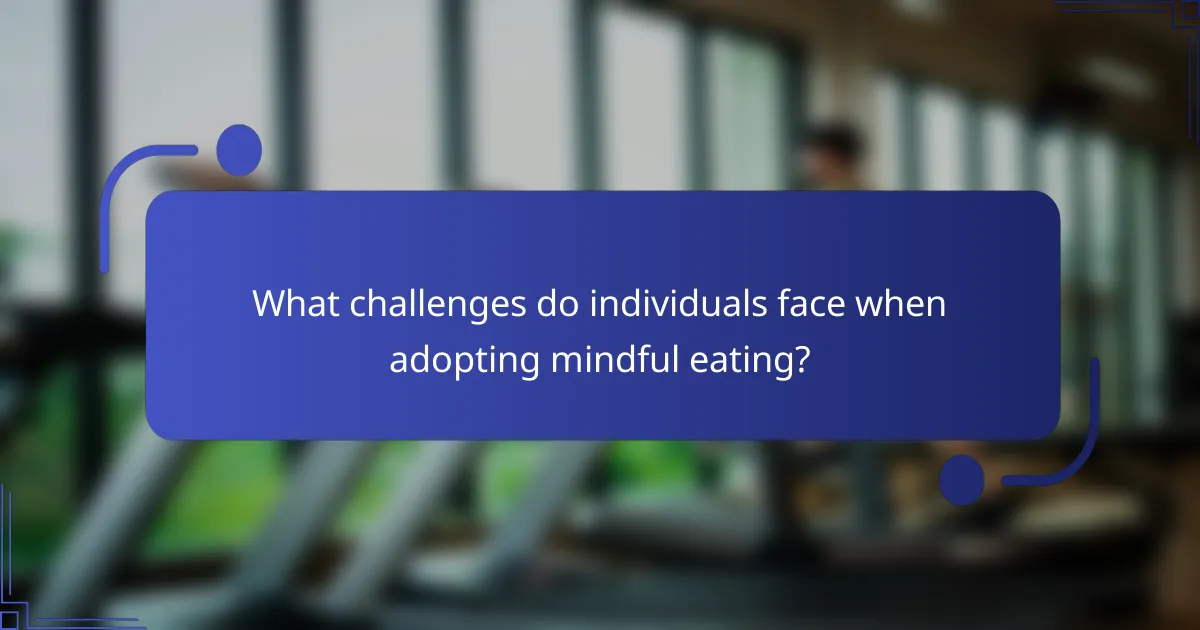Mindful eating practices can significantly improve your health and emotional well-being. These practices focus on being present during meals, enhancing digestion, and promoting healthier choices. They also help reduce emotional eating and foster a positive relationship with food. Additionally, cultural variations and technological tools can support your journey toward mindful eating.

What are the fundamental principles of mindful eating practices?
Mindful eating practices focus on being present during meals to enhance health and emotional well-being. Key principles include paying attention to hunger cues, savoring food, and minimizing distractions. These practices foster a positive relationship with food, promote healthier choices, and improve digestion. Engaging all senses during meals can lead to greater satisfaction and reduced overeating. Additionally, reflecting on emotional triggers can help individuals make mindful choices rather than impulsive ones.
How does mindfulness enhance the eating experience?
Mindfulness enhances the eating experience by promoting awareness and appreciation of food. This practice encourages individuals to savor each bite, leading to improved digestion and satisfaction. Mindful eating reduces emotional eating by fostering a deeper connection to hunger cues. As a result, individuals often experience better emotional well-being and healthier eating habits.
Why is awareness of hunger and satiety important?
Awareness of hunger and satiety is crucial for mindful eating, as it helps individuals make informed food choices. Recognizing these signals promotes healthier eating habits and prevents overeating. Studies show that people who are attuned to their hunger cues tend to have better emotional well-being and maintain a healthier weight. This awareness fosters a positive relationship with food, reducing stress and anxiety related to eating.

How do mindful eating practices impact physical health?
Mindful eating practices significantly enhance physical health by promoting better digestion, weight management, and reduced emotional eating. These practices encourage individuals to focus on their food, leading to more conscious choices and improved nutrient intake. Research indicates that mindful eating can lower the risk of obesity and related conditions by fostering awareness of hunger cues and satiety signals. As a result, individuals may experience improved metabolic health and overall well-being.
What are the benefits of mindful eating for weight management?
Mindful eating enhances weight management by promoting awareness of hunger cues and food choices. This practice encourages individuals to savor their meals, leading to reduced overeating and improved satisfaction. Studies show that mindful eating can decrease binge eating episodes and emotional eating, contributing to healthier weight outcomes. Additionally, it fosters a positive relationship with food, which can enhance overall emotional well-being.
Which health conditions can be improved through mindful eating?
Mindful eating can improve various health conditions, including obesity, diabetes, and anxiety. This practice promotes awareness of hunger cues and emotional triggers, leading to healthier eating habits. Research indicates that mindful eating can reduce binge eating episodes and improve overall emotional well-being. Additionally, it fosters a positive relationship with food, aiding in weight management and better digestion.

How does mindful eating influence emotional well-being?
Mindful eating significantly enhances emotional well-being by fostering awareness and reducing stress. This practice encourages individuals to connect with their food, promoting healthier choices and improving mood. Research shows that mindful eating can decrease emotional eating, leading to better emotional regulation. By focusing on the sensory experience of eating, individuals may cultivate gratitude and satisfaction, which positively impacts mental health.
What role does mindful eating play in stress reduction?
Mindful eating significantly reduces stress by promoting awareness and presence during meals. This practice encourages individuals to savor food, which fosters a positive emotional state. Research indicates that mindful eating can lead to lower cortisol levels, the hormone associated with stress. By focusing on sensory experiences, individuals develop a healthier relationship with food, enhancing overall emotional well-being. Additionally, mindful eating can prevent overeating, which often contributes to stress.
How can mindful eating improve relationship with food?
Mindful eating significantly enhances the relationship with food by fostering awareness and appreciation. It encourages individuals to listen to their hunger cues, promoting healthier choices and portion control. This practice reduces emotional eating by cultivating a non-judgmental environment around food, leading to a more positive self-image. Studies show that mindful eating can decrease binge eating episodes and improve overall satisfaction with meals. As a result, individuals often experience enhanced emotional well-being and a more balanced approach to nutrition.

Which cultural variations exist in mindful eating practices?
Cultural variations in mindful eating practices include diverse approaches influenced by local traditions, beliefs, and dietary habits. For instance, in Japan, the practice emphasizes portion control and presentation, promoting appreciation for food. In contrast, Mediterranean cultures focus on communal dining and savoring flavors, enhancing social connections. Additionally, Indigenous practices often integrate spirituality and connection to the land, fostering gratitude for food sources. These variations highlight how cultural contexts shape the principles of mindful eating, enriching its practice worldwide.
How do different cultures interpret mindfulness in eating?
Different cultures interpret mindfulness in eating through unique practices that enhance health and emotional well-being. For example, in Japan, the concept of “Hara Hachi Bu” emphasizes eating until 80% full, promoting moderation. In contrast, Mediterranean cultures focus on communal meals, fostering connection and enjoyment. These practices reflect diverse values, such as balance and social interaction, contributing to overall wellness. Additionally, mindfulness techniques often include savoring flavors and appreciating food, enhancing the emotional experience of eating. Each cultural interpretation ultimately aims to cultivate a deeper awareness of food choices and their impact on health.
What unique mindful eating rituals are observed globally?
Unique mindful eating rituals observed globally include practices such as Japanese “Ikigai,” which emphasizes finding purpose in meals, and India’s “Sattvic” diet, focusing on pure, wholesome foods. In Italy, the tradition of “Slow Food” promotes enjoyment and appreciation of meals, while in Sweden, “Allemansrätten” encourages foraging and connecting with nature through food. These rituals enhance health and emotional well-being by fostering a deeper relationship with food and mindfulness in eating habits.

What challenges do individuals face when adopting mindful eating?
Individuals face several challenges when adopting mindful eating practices, including distractions during meals, emotional triggers, and lack of awareness. Distractions from technology or multitasking can hinder focus on food. Emotional triggers may lead to overeating or unhealthy choices. Additionally, many struggle with recognizing hunger cues and portion sizes, making mindful eating more difficult. These obstacles can impede the journey toward improved health and emotional well-being.
How can one overcome common obstacles to mindful eating?
To overcome common obstacles to mindful eating, one should practice self-awareness, eliminate distractions, and establish a routine. Recognizing emotional triggers helps in making conscious food choices. Creating a calm eating environment enhances focus on meals. Setting specific times for meals fosters consistency and mindfulness.
What misconceptions exist about mindful eating?
Many misconceptions about mindful eating hinder its benefits. Some believe it simply involves eating slowly, while it actually encompasses awareness of hunger cues and emotional triggers. Others think it requires strict dietary rules, but it promotes flexibility and enjoyment of food. Additionally, some assume mindful eating is only for weight loss, yet it enhances overall well-being and emotional health. Misunderstandings about its complexity can prevent individuals from fully embracing its principles for improved health.

How can technology support mindful eating practices?
Technology can significantly enhance mindful eating practices by providing tools that promote awareness and intentionality during meals. Apps can track food intake, helping users recognize patterns and make informed choices. Wearable devices can remind individuals to pause and reflect on their hunger cues, fostering a deeper connection to their eating habits. Virtual reality experiences can simulate mindful eating environments, encouraging users to engage with their meals more thoughtfully. Online communities offer support and shared experiences, reinforcing positive behaviors and accountability. These technological innovations align with the unique attribute of mindfulness, enhancing emotional well-being and health outcomes.
Which apps are effective for promoting mindful eating?
Several apps effectively promote mindful eating by encouraging awareness of food choices and portion sizes. Notable options include MyFitnessPal, which tracks nutrition and encourages healthy habits, and Headspace, offering guided meditations focused on eating. Another excellent choice is Eat Right Now, designed specifically to tackle emotional eating triggers. Additionally, Calm provides mindfulness exercises that can enhance the eating experience. Lastly, Noom combines psychology with food tracking to foster mindful eating behaviors.
What digital resources are available for learning mindful eating?
Various digital resources are available for learning mindful eating, including apps, online courses, and websites. Popular apps like “Eat Right Now” and “Mindful Eating Tracker” help users practice mindfulness during meals. Online courses from platforms such as Coursera and Udemy offer structured learning on mindful eating techniques. Websites like the Center for Mindful Eating provide articles, webinars, and community forums for support and guidance. These resources enhance understanding and practice of mindful eating for improved health and emotional well-being.

What are the long-term effects of consistent mindful eating practices?
Consistent mindful eating practices lead to improved emotional well-being and physical health over the long term. These practices enhance awareness of hunger cues, reduce emotional eating, and promote healthier food choices. As a result, individuals often experience weight management, reduced stress levels, and improved digestion. Research indicates that mindful eating can lower anxiety and depression symptoms, contributing to overall mental health. Engaging in this practice fosters a positive relationship with food, encouraging gratitude and enjoyment during meals.
How does mindful eating contribute to sustainable eating habits?
Mindful eating fosters sustainable habits by promoting awareness of food choices and reducing waste. Practicing mindful eating encourages individuals to savor meals, leading to better portion control and less overeating. This approach emphasizes the quality of food over quantity, which can drive a shift towards local and seasonal produce. As a result, mindful eaters often prioritize sustainability by choosing environmentally friendly options. Research indicates that mindful eating can improve emotional well-being, reducing stress and enhancing the enjoyment of food, which further supports lasting dietary changes.
What changes can be expected over time with mindful eating?
Mindful eating can lead to gradual improvements in health and emotional well-being. Over time, individuals may experience better digestion, weight management, and reduced emotional eating. These changes stem from increased awareness of hunger cues and food choices. As a result, mindful eating fosters healthier relationships with food, promoting long-term lifestyle transformation.
What best practices can enhance the effectiveness of mindful eating?
Practicing mindful eating can significantly improve health and emotional well-being. Focus on the following best practices:
1. Slow down during meals to enhance awareness of hunger and satiety cues.
2. Minimize distractions, such as screens, to fully engage with the eating experience.
3. Savor each bite by paying attention to flavors, textures, and aromas.
4. Reflect on food choices and their impact on both physical health and emotional state.
5. Establish a regular eating schedule to promote a balanced approach to nutrition.
6. Practice gratitude for food, fostering a positive relationship with eating.


